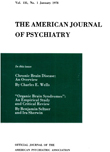Myths of "shock therapy"
Abstract
The author discusses the myths of the ECT process--that shock and the convulsion are essential, memory loss and brain damage are inescapable, and little is known of the process--and assesses the fallacies in these ideas. Present views of the ECT process suggest that its mode of action in depression may best be described as a prolonged form of diencephalic stimulation, particularly useful to affect the hypothalamic dysfunctions that characterize depressive illness. The author emphasizes the need for further study of this treatment modality and for self-regulation by the profession.
Access content
To read the fulltext, please use one of the options below to sign in or purchase access.- Personal login
- Institutional Login
- Sign in via OpenAthens
- Register for access
-
Please login/register if you wish to pair your device and check access availability.
Not a subscriber?
PsychiatryOnline subscription options offer access to the DSM-5 library, books, journals, CME, and patient resources. This all-in-one virtual library provides psychiatrists and mental health professionals with key resources for diagnosis, treatment, research, and professional development.
Need more help? PsychiatryOnline Customer Service may be reached by emailing [email protected] or by calling 800-368-5777 (in the U.S.) or 703-907-7322 (outside the U.S.).



